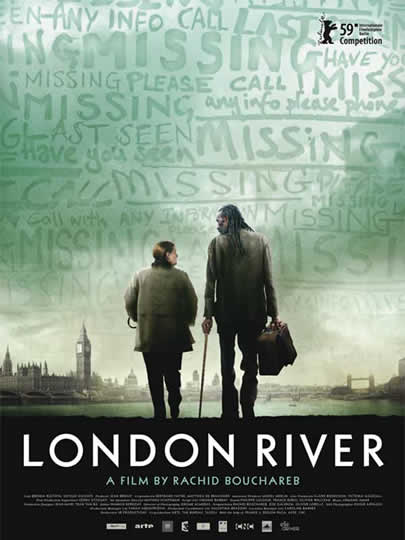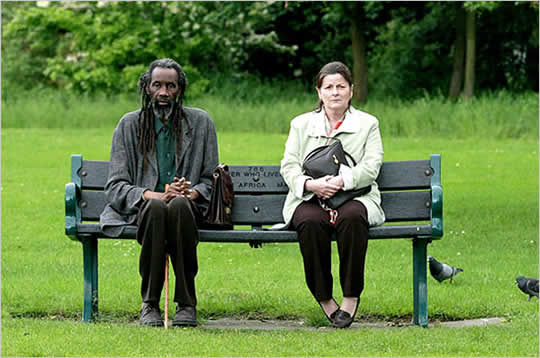Set against the backdrop of the July 7th 2005 terrorist attacks, LONDON RIVER follows Elisabeth (BAFTA winner, Academy Award nominee Brenda Blethyn) from a small farming community in Guernsey as she travels to London in the immediate aftermath of the bombings after failing to hear from her daughter. Elizabeth is disturbed by the confusion of the metropolis and above all, by the predominantly Muslim neighborhood where her daughter lived. Her fear and prejudice escalate when she discovers that her daughter was converting to Islam and as she keeps crossing paths with Ousmane (Berlin’s Silver Bear winner, Sotigui Kouyaté), a West African who has come from France to find his missing son. Although they come from very different backgrounds, Elizabeth and Ousmane share the same hope of finding their children alive. Putting aside their cultural differences, they give each other the strength to continue the search and maintain their faith in humanity.
Rachid Bouchareb, director of London River is born in France, Rachid Bouchareb attended film school in Paris. After several shorts, he directed Bâton Rouge (1985) which addressed the top of immigration. In 1996, he co‐wrote and directed Dust of Life and received his first  Oscar nomination for Best Foreign Film. His next film, Little Senegal (also starring Sotigui ouyaté) explored the racial friction between Africans from the homeland and the African‐Americans whose ancestors were brought to the U.S. through the slave trade. In 2006, Days of Glory, the story of African and Maghrebin infantrymen in 1943, received a Collective Prize for Best Actors at the Festival de Cannes. Hailed across the world, the film won the César for Best Script and was nominated for the Oscar of Best Foreign Film. His last film, Outside the Law competed for the Palme d’Or Award at the Cannes Film Festival in 2010 and was his third Oscar nomination for Best Foreign Film. Currently, Bouchareb is in the works to produce an Arab‐American Trilogy to address the changing relationship between Americans and the Arab world. He has finished principal photography on the first film of the trilogy, Just Like a Woman, starring Sienna Miller. The next two films will be set in the U.S. but with Arabic sensibilities including a buddy comedy and a Mexican border drama starring Forest Whitaker. All three films will be in English.
Oscar nomination for Best Foreign Film. His next film, Little Senegal (also starring Sotigui ouyaté) explored the racial friction between Africans from the homeland and the African‐Americans whose ancestors were brought to the U.S. through the slave trade. In 2006, Days of Glory, the story of African and Maghrebin infantrymen in 1943, received a Collective Prize for Best Actors at the Festival de Cannes. Hailed across the world, the film won the César for Best Script and was nominated for the Oscar of Best Foreign Film. His last film, Outside the Law competed for the Palme d’Or Award at the Cannes Film Festival in 2010 and was his third Oscar nomination for Best Foreign Film. Currently, Bouchareb is in the works to produce an Arab‐American Trilogy to address the changing relationship between Americans and the Arab world. He has finished principal photography on the first film of the trilogy, Just Like a Woman, starring Sienna Miller. The next two films will be set in the U.S. but with Arabic sensibilities including a buddy comedy and a Mexican border drama starring Forest Whitaker. All three films will be in English.
Bijan tehrani: How did you first come up with the idea of making London River?
Rachid Bouchareb: The reason I made this movie was that I wanted to work again with Sotigui Kouyaté, the African actor and I also loved to work with the English actress Brenda Blethyn. I based the idea on my own past and my disappointment in the French society after 9/11 and bombing attacks in Paris. I was born in France but I am from a Muslim family, so I thought that it would be interesting to have a movie around this subject. For me it was interesting to make a film with an African Muslim man and an English Christian woman.
 BT: It seems that this is a theme that you are following on most of your films, where you have people from different cultures coming together.
BT: It seems that this is a theme that you are following on most of your films, where you have people from different cultures coming together.
RB: Yes because this comes from my own history. My family comes from Algeria in North Africa and then we moved to France in order for my parents to work in France and I was born in Paris and then my family went back to Algeria. All the time that I was growing up with this background in Paris, my father used to say that one day we should go back to our home country. I spent a lot of time in life within a suitcase, so this is why I make a lot of movies where my character travels from one place to another.
BT: You bring two totally different people and make them understand each other, how did you go about selecting the actors for the film?
RB: I already knew Sotigui Kouyaté, The African actor and I had made a movie with him two years ago in Harlem about slavery, and I wanted to continue working with him. I discovered Brenda Blethyn in Secret and Lies and some other movies and I wanted to have both of them in a movie as they are both wonderful actors.
BT: How did you work with the actors, did you do a lot of rehearsals?
RB: No, at the start of shooting a film I always have a very small script with a few line of dialogue, I knew where I wanted to go with the film. For London River I spent two weeks with the actors prior to the shooting of film and during few weeks of shooting we had a lot of improvisation. Sometimes I had only two lines of dialogue for a scene and I was working with the actor to create and expand the rest of the scene. I did it this way because I was trusted the creativity of Sotigui Kouyaté; and I have to say that Brenda comes with the same kind of talent.
BT: How has the reaction been to the film in different communities?
RB: The reaction has been good a lot of associations and schools have reacted positively to this subject. The movies have traveled a lot and has sparkled a lot of debate wherever it has been shown.
BT: How did you come up with the story of London River?, Was this based on something real or was this based on made up characters because the story is very believable.
RB: The story is believable because we can imagine a situation like this, when I read the newspaper and articles about the suicide bomb attacks in London subways it was easy to find the scenes of the film and create a realistic situation. When you are a father or a mother looking for your missing child, you need to put many pictures of your son or your daughter everywhere; you might have to go to the police station in the city and to try and find the maximum information about them and afterwards you need to wait, just like in London River. So I think that these situations really do happen, especially after a bombing attack like this.
BT: How did you come up with the visual style of the film?
RB: The visual style is like a documentary, I don’t want to have pictures in my mind, I always take a small crew (about 20 people) and a very small camera and I would like to create the feel of a news reel and be more open and let the actors decides how they want to work and see and move and camera is there for just following them. When you do it other ways you give a lot of limitations to the actors, I think for my kind of stories it is more important for the camera to follow the actor.
BT: What do you want to achieve as a filmmaker?
RB: I would like to continue to make movies and to travel. I want to continue to show my films in schools or cinemas or associations and makes films that help human rights, I would like to continue making films with the same subjects that I have been studying.

